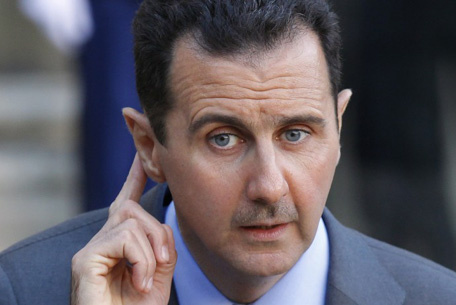Syria at a Crossroads

But in a wave of protests in the city of Daara, the offices of the Syrian Baath Party and the mobile center owned by Bashar al-Assad’s family were burned and people chanted anti-government slogans. After Lazqiyah, Aleppo, and other cities had joined the protesters, the Syrian government sponsored wide promotional activities and called the protesters rioters who took orders from foreign countries- some of whom were arrested and confessed to this crime while Syrian television broadcast some of their confessions.
The Syrian government spokesman also announced that some of the demonstrators had opened fire on security forces and it had to be determined which countries had supplied their arms. Simultaneously wide public protests were organized by the government that according to many news agencies, police forces in civilian garb (together with their families) participated in, holding up pictures of Bashar al-Assad, condemning anarchist protesters, and announcing their support for the one-party government of Bashar al-Assad.
Of course, that is just one side of the coin, because the government believes that its actions are like painkillers that may ease suffering in the short term; then, the governmental reform will start in this country. The first reform action was the release of nearly 260 of political prisoners, although the Syrian government spokesman immediately declared that there were no political prisoners in this country! The next step was the government’s resignation, and the formation of a new one. Bashar al-Assad promised to simultaneously make adjustments in the constitution and to take measures to eliminate the one-party system in Syria after 50 years, and to let new political parties be formed.
Syria is now at an important crossroads, and the government’s response in the following days will decide Syria’s future. Although the Syrian authorities have shown so far that they are professional actors in the foreign policy scene, they have not achieved a good record in domestic affairs: police and a daunting system can suppress the protests, such as with the terrible massacre in Hima city where thousands were killed [1], and they can calm the situation but these measures- an iron fist and the government’s promotional efforts- are ineffective due to the expansion of virtual communications networks and satellite television.
While the current generation is not affected by ideological propaganda, it fundamentally lacks ideology. Moreover, the new wave lapping at the regional countries is a leaderless movement that has caused the intelligence agencies to face a crisis, because former dissident leaders cannot control these uprisings.
It seems the Syrian authoritarian and totalitarian regime will take corrective measures to deliberately attract the youth and their measures. The other point is that the government of Syria has learned lessons from the recent uprisings, accepted reforms and shared the government with the people, because in addition to the protests of the local people, its foreign policy has been attacked by Western countries. However, it is not in favor of the government!
[1] - Oppressive governments think that the memory of these bloody and painful events will not be revived over time, ignoring the divine tradition that nothing vanishes and on the Day of Revelation all secrets will be revealed. The memories are retained in the historical memory of nations, but people do not protest until they have good opportunity. However, at the first appropriate opportunity, they consider all these problems and react.

